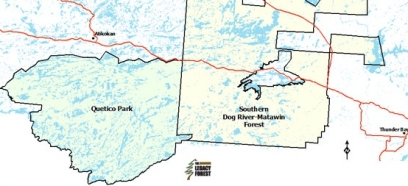The Legacy Forest
The Legacy Forest is a forest where research is carried out that examines the impacts of intensive forest management, as it relates to the values and goals associated with sustainable management practises. Two main queries are under consideration in the research:
What are the relationships between intensive silvicultural treatments, site biodiversity, ecosystem function, and non-timber values?
What are some corresponding trends in landscape level biodiversity, ecosystem function, and non-timber values as forest management intensity changes?
The Legacy Forest is a framework for research projects that work to answer the above two questions. Principle areas of study include recreation and tourism, socio-economics, wood supply and quality, aquatic environments, and terrestrial environments.
Landbase
The Legacy Forest includes the southern half of Bowater's Dog River-Matawin Forest and the adjacent Quetico Park.

This combination of both managed and protected forest is considered large enough to contain most or all of the desired study areas. With its highly diversified forest, wetland, and aquatic vegetation, the Legacy Forest represents the convergence of three major ecosystems, the confluence of three major climate systems, the headwaters of three continental watersheds, and finally, the continental north-south divide. This area also encompasses an impressive variation in terms of forest management and protection, where demands are high for both timber and non-timber values; these include canoeing, hunting, fishing, commercial tourism, etc. The proximity of the Legacy Forest to Thunder Bay and the fact that it is contiguous with Minnesota's Superior National Forest, make it an ideal choice for research.
Partners
This project results from collaboration among many groups with a variety of interests. Bowater, MNRF, and Ontario Parks have all contributed initial data for the project and have committed to managing the forest consistent with research goals. Future forest management planning and operational activities will be influenced by this project. Lakehead University's Faculty of Natural Resources Management coordinates, administers, and manages the Legacy Forest research.
Project Components
There are several key components to the framework that is the Legacy Forest. In order to meet the long-term goals fo the project, the forest is stratified into zones of varying management intensity. Complete and consistent datasets will be made available to researchers, and strategies for ongoing research and education will be implemented.
For More Information, please visit:
The Legacy Forest website
http://www.legacyforest.ca

